A prenuptial agreement defines asset division and financial responsibilities before marriage, while a divorce settlement resolves these matters after separation. Discover the key differences and advantages of each in this article.
Table of Comparison
| Aspect | Prenuptial Agreement | Divorce Settlement |
|---|---|---|
| Definition | Legal contract signed before marriage outlining asset division and financial responsibilities. | Legal agreement reached during or after divorce specifying financial and custody arrangements. |
| Purpose | Protect individual assets and define financial terms in case of divorce or death. | Resolve financial disputes and divide assets upon marriage dissolution. |
| Timing | Executed before marriage. | Created during or after the divorce process. |
| Financial Scope | Predefines division of assets, debts, spousal support, and estate rights. | Defines division of assets, debt liabilities, child support, and alimony. |
| Legal Binding | Enforceable contract if fair, voluntary, and properly executed. | Court-approved agreement legally binding after divorce decree. |
| Flexibility | Limited; must be agreed upon pre-marriage and often rigid. | More flexible; negotiated based on current circumstances. |
| Financial Management Impact | Ensures clarity and control over financial assets in marriage. | Facilitates equitable division of finances post-marriage. |
Understanding Prenuptial Agreements
A prenuptial agreement outlines asset division and financial responsibilities established before marriage, offering clarity and protection for both parties. Divorce settlements, in contrast, resolve these matters after marital breakdown, often involving court mediation or negotiation. Understanding prenuptial agreements helps couples proactively safeguard their interests, minimizing conflicts and legal expenses if divorce occurs.
What is a Divorce Settlement?
A divorce settlement is a legally binding agreement reached between spouses to resolve issues such as asset division, child custody, and spousal support during divorce proceedings. Unlike a prenuptial agreement that is established before marriage to outline financial rights, a divorce settlement is negotiated after the decision to divorce. Divorce settlements provide a structured resolution, minimizing court intervention and ensuring both parties' rights are protected during marital dissolution.
Key Differences Between Prenuptials and Divorce Settlements
Prenuptial agreements are legal contracts signed before marriage to outline asset division and financial responsibilities in the event of divorce, while divorce settlements are negotiated agreements finalized during or after divorce proceedings to resolve asset distribution, custody, and support issues. Prenuptial agreements focus on preemptive protection and clarity, often preventing lengthy disputes, whereas divorce settlements address actual separation conditions, reflecting changes in circumstances since marriage. Key differences include timing, scope of coverage, and enforceability, with prenups emphasizing future contingencies and settlements detailing immediate post-marriage arrangements.
Legal Requirements for Prenuptial Agreements
Prenuptial agreements require full financial disclosure from both parties and must be voluntarily signed without coercion to be legally enforceable. The agreement should be in writing and notarized according to state laws, often necessitating legal counsel for proper drafting and execution. Your prenuptial agreement protects your assets by clearly defining property rights and financial obligations prior to marriage, contrasting with divorce settlements, which negotiate asset division after marital dissolution.
Scope and Coverage: Prenup vs Divorce Settlement
Prenuptial agreements primarily cover the distribution of assets and financial responsibilities before marriage, aiming to protect individual property rights and manage potential future disputes. Divorce settlements focus on resolving all aspects of marital dissolution, including asset division, spousal support, child custody, and visitation rights. The scope of prenuptial agreements is narrower and preventive, while divorce settlements provide a comprehensive resolution tailored to the specific circumstances at the time of divorce.
Financial Protection and Asset Division
Prenuptial agreements establish clear financial protection and asset division before marriage, safeguarding Your assets and defining financial responsibilities in case of divorce. Divorce settlements, negotiated after separation, determine asset division and financial support based on the current circumstances, often leading to more complex disputes. Prenuptial agreements offer proactive clarity and security, minimizing conflicts over finances compared to the reactive nature of divorce settlements.
Enforceability in Court: Comparing Both
Prenuptial agreements and divorce settlements both play critical roles in protecting your assets, but their enforceability in court can vary significantly based on jurisdiction and how they were drafted. Prenuptial agreements are generally enforceable if they meet legal requirements such as full disclosure, fairness, and voluntary consent, while divorce settlements often require court approval to become binding. Understanding the nuances in enforceability helps ensure your agreement holds up during legal proceedings and secures your financial interests.
Common Misconceptions About Prenuptials and Settlements
Prenuptial agreements are often misunderstood as only protecting wealthy individuals, while in reality, they clarify financial expectations and asset division for all couples. Divorce settlements are commonly confused with prenups, but settlements occur post-separation to resolve disputes on property, alimony, and custody. Both legal tools aim to reduce conflict and provide clarity, yet prenuptial agreements proactively establish terms before marriage, whereas divorce settlements are reactive agreements reached during or after divorce proceedings.
When to Consider a Prenuptial Agreement
You should consider a prenuptial agreement before marriage to clearly define asset division, debt responsibility, and spousal support in the event of divorce or separation. Unlike a divorce settlement, which is negotiated after marital breakdown, a prenuptial agreement offers proactive protection for individual property and financial interests. Legal experts recommend drafting a prenuptial agreement early to prevent future conflicts and ensure transparency.
Choosing the Right Approach for Your Situation
Choosing the right legal approach between a prenuptial agreement, divorce settlement, or postnuptial agreement depends on the marital timeline and asset protection needs. Prenuptial agreements are drafted before marriage to outline asset division and spousal support, while divorce settlements resolve financial and custody issues after separation. Postnuptial agreements, created during marriage, serve to update or establish terms similar to prenuptial agreements, providing flexibility tailored to evolving circumstances.

Infographic: Prenuptial Agreement vs Divorce Settlement
 relatioo.com
relatioo.com